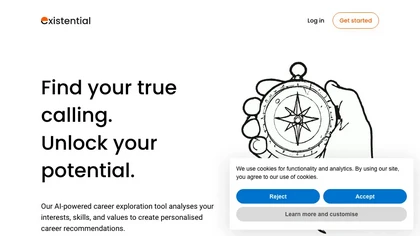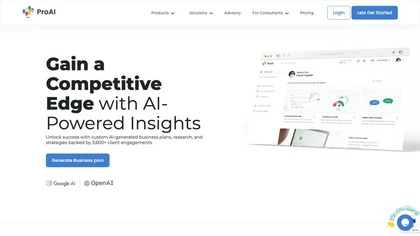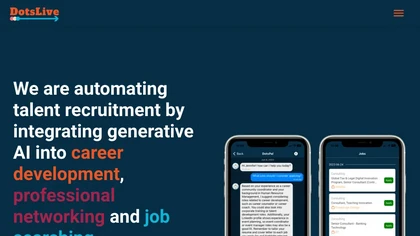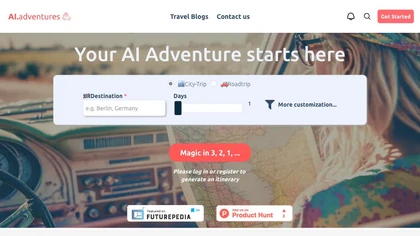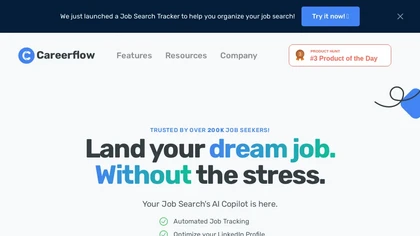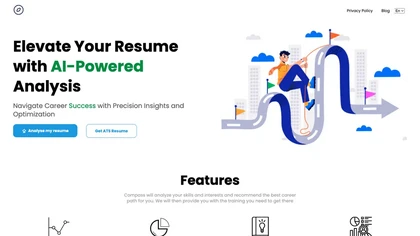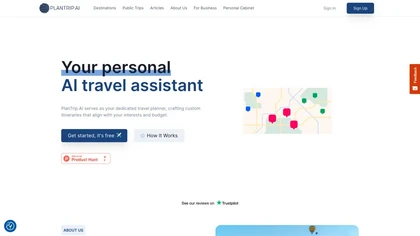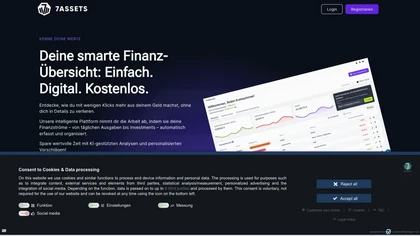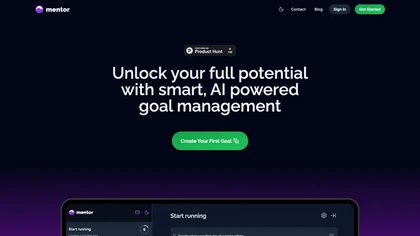AI use cases for Decision-making
Generative AI can be applied in various applications for decision-making. Here are some examples to explore below for inspiration with AI tools to get you started with using AI in decision-making.
🛠️ 70 AI tools for Decision-making
Explore a dynamic list of some of the most popular tools to get you started with various AI use cases and applications for Decision-making to streamline your workflows and productivity today.
Monarch money features
- Net worth syncing
- Budgeting
- Recurring investments
- Spending insights
- Collaborative solutions
1st things 1st features
- Prioritization
- Smart comparison
- Customizable templates
- Ai-powered autosuggestion
- Goal alignment
Tendi features
- AI-powered personal financial advisor
- Assists in setting financial goals, planning, budgeting, and achieving milestones
- Analyzes spending, saving, and investing behaviors
- Provides actionable insights and personalized financial advice
- Ensures data security through advanced encryption and strict privacy protocols
Moments features
- Task Prioritization
- Events and Reminders
- AI Messages Composer
Insightful features
- Provide personalized on-demand coaching
- Focus on specific needs
- Available anytime, anywhere
- Blog with latest insights on living a fulfilling life
- Accountability coaching to help young professionals reach full potential
RetireMint features
- Virtual retirement planning assistant
- Assessment of retirement readiness
- Personalized feedback and advice
- Professional assessments in various retirement-related areas
- Comprehensive retirement roadmap building tools and resources
🔥
Create your account, save tools & get personal recommendations
Receive a weekly digest of our handpicked top tools.
Unsubscribe anytime
Existential features
- Career exploration
- Interest analysis
- Skills assessment
- Value alignment
- Potential career path suggestion
Decisionmentor features
- Decision support and analysis tool
- Criteria-based decision process
- Side-by-side option comparison
- Visualization of decisions based on criteria
- Integration of AI mentor feature
Roam Around features
- Travel planning
- Customized travel plans
- Pet-friendly itineraries
- Budget-friendly trips
- Honeymoon itineraries
- Family-friendly itineraries
Mint features
- Financial transaction tracking
- Account linking with over 17,000 financial institutions
- Categorization of transactions
- Insights on monthly spending habits
- Expense tracking and analysis
Lebenmaster features
- 3-step process for goal forecasting
- Daily progress logs
- Task management functionality
- Brainstats feature
- Support for executing tasks faster and efficiently
Careerhub-ai.com features
- Career guidance
- Salary potential estimation
- Personalized cover letter writer
- Insights into market value
- Access to interview questions and answers
Well Me Right features
- AI matching and Health Coach capabilities
- Personalized coaching
- Dietary tracking, nutritional guidance
- Guided meditation sessions
- Adaptive health partner
JourneyPlan features
- Destination selection
- Travel duration planning
- Budget planning
- Accommodation preference setting
- Activity and restaurant recommendation
Interflexion features
- Career coaching
- Personalized development plan
- Skill assessments
- Goal setting
- Progress tracking
Travelities features
- Trip planning
- Personalized recommendations
- Travel deals
- Place recommendations
- Things to do
ProAI features
- Business strategy generator
- Interactive Guidance and follow up
- Metrics monitoring and insights
- Market research
- Financial forecast
- Pitch deck generator
Plan Quest features
- Visual timeline
- Objectives and key results (OKRs)
- Notion-like editor
- Reflection canvas
- Timeline visualization
Palm features
- Automatically mapping out skills
- Visualizing real-time skills gaps
- Extracting skills from job descriptions
- Creating non-linear career paths
- Simplifying talent identification
MealMate
5MealMate features
- Plan meals
- Tailor dietary preferences
- Consider budget
- Adjust for time constraints
Lifesage features
- Health
- Wealth
- Wisdom
- Personal development
- Self-improvement
Wonderplan features
- Personalized itinerary generation
- Customizable itinerary planning
- Real-time collaboration
- Trip feedback improvement
- Connecting with like-minded travelers
PlanTripAI features
- Trip planning
- Customized itinerary
- Personalized travel
- Generate based on interests
- Budget
Travopo features
- Travel planning
- Inspiration
- Flight search
- Hotel search
Unschooler features
- Career guidance
- Personalized courses
- Video courses
- Quizzes
- Ai feedback
MyCody features
- Streamline career journaling process
- Centralize career management
- Track achievements, goals, and learning experiences
- Provide insightful analysis summaries of career logs
- Offer personalized goal-setting and organization through customizable tags
Bettertravel features
- Generate personalized travel recommendations
- Customize itineraries based on user preferences and interests
- Assist with travel planning without extensive research
- Easily input budget and travel plans
- Provide tailored recommendations for a more enjoyable trip
VERA features
- Identifying ideal career path
- Providing personalized recommendations
- Offering practice interviews
- Giving personalized feedback
- Providing expert advice
CareerGPT features
- Exploring career options
- Assisting job seekers
- Helping high school and college students
- Providing practical and realistic results
- Offering both practical and creative career paths
F.I.R.E on track features
- AI-powered financial assistant
- Personalized recommendations based on goals
- Real-time financial assistance
- Income, expenses, and savings tracking
- Goal reminders and progress tracking
Plan My Trip ASAP features
- Custom itinerary planning
- Pre-made itinerary selection
- Top dining recommendations
- Top bar recommendations
- Top cafe recommendations
Qashboard features
- Financial data analysis
- Automated transaction tracking
- Conversational AI interface
- Secure data storage control
- Finance-related Q&A feature
SmartLifeSkills
4.8SmartLifeSkills features
- Interactive platform with AI chatbots
- Multilingual lessons with authentic accents
- Adjustable playback speed
- Advanced text-to-speech technology
- Custom quiz generator
Tripplanner.ai features
- Suggest potential destinations
- Receive personalized itineraries
- Suggest nearby restaurants and attractions
- Plan a trip without having to research destinations and activities for hours
Interviewable features
- Craft tailored interview responses
- Receive personalized feedback
- Improve interview delivery
- Align skills with employer needs
- Track progress and make curriculum adjustments
Savvy Planner features
- Task Automation
- Data Analysis
- Language Processing
- Project Scheduling
- Deadline Prediction
Planit Earth features
- Generate personalized itineraries
- Cater to traveler's interests and budget
- Provide detailed itineraries
- Easily accessible through a link or pdf
Career.io features
- Resume builder with market-tested AI phrases
- Job search strategy planner
- Free resume review feature
- Professional resume writing services
- Powerful job tracker
DotsPal features
- Talent recruitment
- Generative ai for career development
- Professional networking
- Job searching
- Personalized career assistant
WisdomPlan features
- Personalized learning journeys
- Intelligent planning capabilities
- Centralized management of courses, documents, and webpages
- Task organization and progress tracking
- Community interaction for sharing plans and experiences
Socra features
- Goal setting
- Assistance
- Achievement
Marketplan features
- Marketing plan management
- Campaign projection
- Collaboration
Travelplan features
- Destination selection
- Itinerary generation
- Travel preferences customization
- Language preference selection
- Friends sharing
AI adventures
1.8AI adventures features
- Generate personalized travel plans
- Offer options for city trips, road trips, and custom itineraries
- Use openai's gpt4 model
- Interactive travel blogs
FolioProjects features
- AI project management assistant
- Data-rich dashboards for analysis
- Project portfolio management workflow
- Enterprise asset management life cycle support
- Predictive, prescriptive, and generative AI capabilities
Careerflow.ai features
- Automated job tracking
- Job application tracker
- Skill insights
- Ai-generated cover letters
- Linkedin profile views improvement
Cleo features
- Budgeting assistance
- Cash flow tracking
- AI-powered features
- Secure platform with encryption
- Financial decision insights
TripClub features
- Interactive calendar
- Tailored trip planning
- Personalized vacation
Nomadspot features
- Trip organization
- Create travel itinerary
- Personal map sharing
- Community sharing
- Ai-powered planner
Zumma features
- Budget creation
- Income and expenses tracking
- Receipt scanning
- Community access for finance resources and tips
- Availability in select cities
Personalities.ME features
- Personality exploration
- Career guidance
- Relationship insights
Mimir features
- Matching
- Mentor
- Advice
- Questions
- Previous queries
MyYearInReview features
- Assist in reflecting on the past year
- Help set goals for 2024
- Provide a guided framework for goal setting
- Maintain complete data privacy
- Transform vague ideas into actionable goals efficiently
Compass features
- Resume analysis
- Career path recommendation
- Skill matching feedback
- Role-specific skill level assessments
- Gap analysis
Coach Me Up! features
- Personalized career support
- 24/7 availability
- Tailored feedback and guidance
- Leverages advanced algorithms and large language modeling AI
- Focus on user privacy and data protection
pathmatch.com features
- AI-powered career matching
- Personalized career matches
- Access to 150+ different careers
- Smart notifications for application deadlines
- Hireability score comparison with peers
FinanceGPT Chat features
- Build custom AI co-pilots
- Semantic search for understanding
- Document upload for tailored answers
- Data source connectivity
- Personalized financial insights
PlanTrip features
- Custom itinerary planning
- Tailored recommendations
- Destination insights
- AI-generated itineraries
- Seamless journey planning
7Assets features
- Automated data capture
- AI-powered analyses
- Personalized suggestions
- Secure data management
- All-in-one asset management
My Travel Brain
1.6My Travel Brain features
- Plan travel
- Knowledge of travel destinations
- Answer questions about travel destinations
planmytripnow.ai features
- Create custom travel itineraries
- Offer low-cost, mid-level, and luxury travel options
- Recommend flight and accommodation deals
- Find best local activities and restaurants
Mentor v1 features
- Goal breakdown into manageable tasks
- Step-by-step guidance for goal achievement
- Progress tracking on a dashboard
- Email notifications for upcoming tasks
- Personalized notes and guidance customization
Origin features
- Holistic net worth tracking
- Smart recommendations for achieving financial milestones
- AI-powered planner for real-time financial queries
- Guidance from certified financial planners
- Automated investing guidance without advisory fees
Balm.ai features
- Personalized coaching
- Access to top experts
- 1-on-1 virtual sessions
- Tailored advice
- Convenient expert connection
Talentplace.ai features
- Intelligent algorithms for matching users with ideal companies
- Premium career profile feature for showcasing achievements, skills, and experiences
- Real-time profile analytics for tracking professional journey
- Big 5 Assessment tool for showcasing personality and skills to employers
- Job-winning resume templates and tailored job listings
IX Coach features
- Goal setting
- Obstacle overcoming
- Action planning
- Social interaction understanding
- Communication improvement
MgrWorkbench.ai features
- Employee performance review
- Developing plans
- Writing business letters
Sixty features
- Prioritization of to-do list
- Inbox management
- Appointment scheduling
- Agenda creation
- Reminder system







